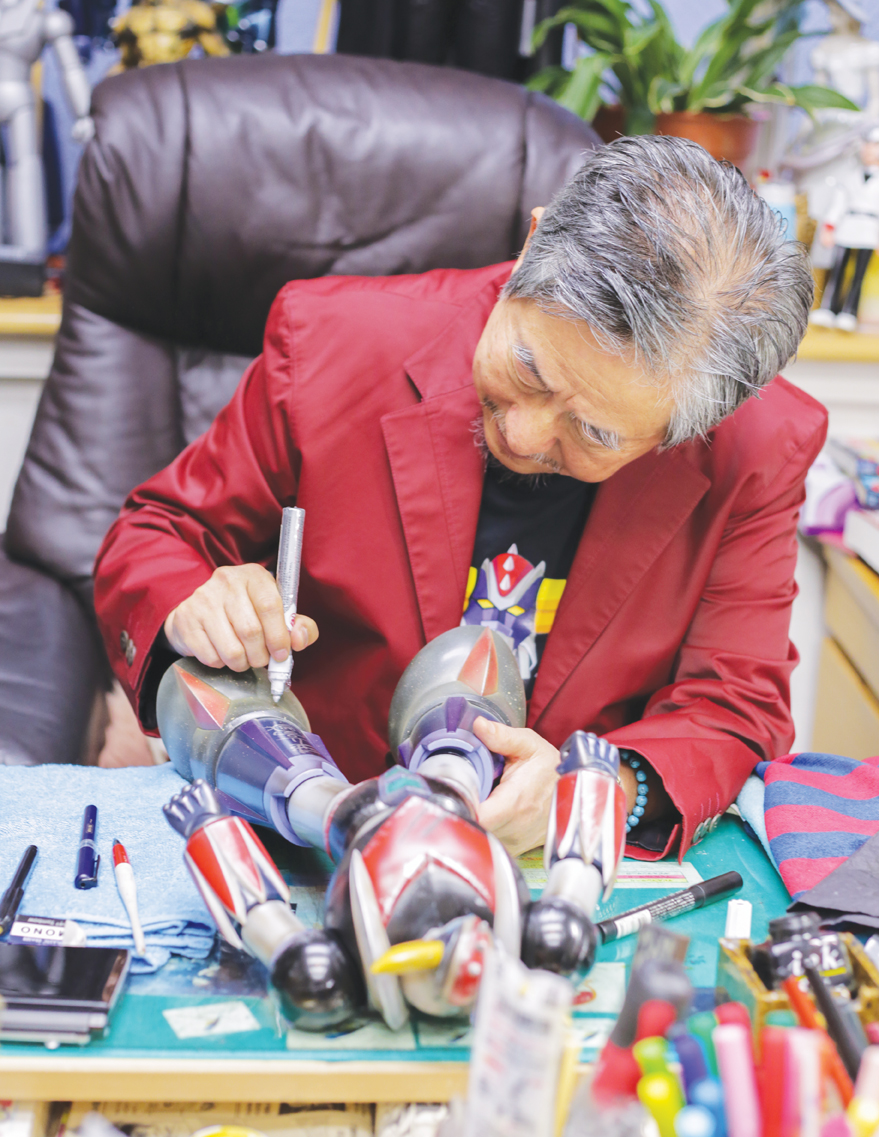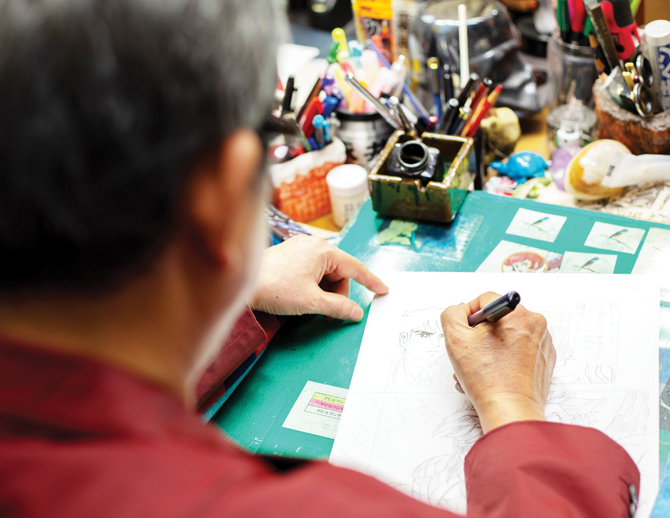TOKYO: While McDonald’s Golden Arches might be a sentimental symbol for anyone who grew up in the West, children of the Arab world, where the burger chain didn’t open until the 1990s, were excited by a different icon: The Golden Horns. The super-robot Grendizer, from the anime of the same name, and his shiny golden helmet horns were as well known across the region as the big golden M of McDonald’s.
The Middle East Equivalent of a Happy Meal was that happy hour when the anime Grendizer, created by Japanese mangaka Go Nagai in 1975, was broadcast on local television.
First shown on Lebanese channel Tele Liban in the 1980s, and one of the few fully dubbed cartoons that were available to watch, tales of the heroic Duke Fleed and his mighty robot were the stuff that every Arab kid’s dreams were made of.
Nagai is famous throughout Japan for revolutionizing the super-robot genre: His were the first to have an actual pilot in the cockpit, and many of his designs are seen as being the standard that all other mecha robots are held up against.
FASTFACTS
- Originally ran for two years: 1975-1977.
- Number of episodes: 74.
- Popular in: France, French-speaking Canada, Italy and the Middle East.
- Part of a series: preceded by Mazinger Z and Great Mazinger.
- Grendizer is one of the most popular foreign icons in the Arabic-speaking world.
His previous works, along with Grendizer, made him famous in Japan, and he has cemented his place as one of the country’s anime and manga legends.
Grendizer is part of the Mazinger trilogy, which consists of Mazinger Z, Great Mazinger and UFO Robot Grendizer. The first two enjoyed massive success in Japan, with Mazinger quickly becoming one of the most recognizable pop culture icons in the country. However, many fans believe Grendizer did not attract the same level of national attention.
Nagai, in an exclusive interview with Arab News at his studio in Tokyo, says that this is not necessarily true. “It was actually a hit in Japan. Maybe some people thought it was not as popular as Mazinger Z, because Mazinger was super popular.”
While Grendizer’s popularity is disputed in Japan, it is certainly not the case in the Arab world. The show was first dubbed in Lebanon and shown on Lebanese TV in the 1980s, but was featured on other Arabic channels as well, such as Kuwait TV and Saudi Channel 1.

Go Nagai has cemented his place as one of Japan’s anime and manga legends. (Supplied)
Long before satellite television was available in the region, and even longer before streaming on demand, Grendizer was an instant hit with local audiences.
All across the region, whenever Grendizer was on TV, the streets were practically empty, but the excitement was through the roof.
Lebanese voice actor Jihad Al-Atrash, who provided the voice of Duke Fleed (or Daisuke, as he is known in the original), attributed the success of Grendizer to two things: its high production values, and the geopolitics of the region of the time.
“I believe that the series preceded its time,” he said in a 2005 interview with regional Arab newspaper Asharq Alawsat “It was executed with perfection with the limited means available back then compared to the present day. It was a huge production by all means.”
As for its regional appeal, Grendizer was first broadcast during the civil war in Lebanon. “The whole Arab world was in grief over the occupied Palestinian territories,” Al-Atrash said.
GO NAGAI'S TIPS FOR ARAB ARTISTS
1. People in Saudi Arabia have their own unique sensibilities, so use those special sensibilities and try to design new art.
2. Create work with originality in mind.
3. Culture and history will have a good influence on your artwork.
4. Make the best use of different natural environments in your artwork.
Growing up in Lebanon during the civil war, Racha El-Saadaoui said that Grendizer shaped her entire childhood.
”It was such a beautiful escape from a horrible childhood in terms of the insecurity of the war, and all the things that children don’t really understand, but still feel impacted by,” she said.
Constant reruns on local channels, the introduction of satellite TV (and later, streaming services) in the region, and even pirated replicas of recorded castings meant that Grendizer became accessible to a new generation of viewers.
Grendizer memorabilia still sells like hotcakes in the region, and its popularity has barely declined. In Dubai, late-night eatery Zaroob features a giant mural of Grendizer on one of its outside walls.
ALSO READ: A Grendizer movie? It's a 'Go,' says Nagai, creator of the famous Japanese anime
Saudi artist and pin designer Labeed Assidmi, who sells pins featuring characters from old Arabic-dubbed anime, told Arab News that his Grendizer pin is one of his most popular and constantly sells out. And antique merchandise, sold at the height of the Grendizer craze, can be found for exorbitant prices on eBay and other auction sites, with some vintage toys in mint condition being worth over a thousand dollars.
More recently, this month’s Joy Forum in Riyadh, Saudi Arabia, an event held to attract foreign investors to Saudi Arabia’s burgeoning entertainment industry, featured a massive statue of Grendizer that greeted the event’s attendees.
The crowds lining up to take a photo with the giant robot are proof enough that his popularity in the region remains untouched.
Another indicator of the popularity of Grendizer is the videos on YouTube, where full episodes dubbed in Arabic amass millions of views. The video of the theme song alone has almost 2 million views.
Nagai, who celebrated 50 years in the industry with an exhibition in Tokyo in August, said that he really appreciates the fans in the Arab world that love his work.

Go Nagai at work.
“I hope you will continue enjoying my work in the future. I know humans live tough lives in various environments and will have to continue on in the future, but I know they feel liberated and happy when they watch anime and immerse themselves in fantasy worlds. I will be happy if you keep that in mind and continue enjoying yourself,” Nagai said.
He also agreed that the timing of Grendizer’s release in the region contributed to its popularity, although he said it was not intentional.
“It was good timing, I think. In the long history of Japan, Japan experienced so many wars in the past as well, so people have that kind of memory deep in their heart. So that probably resonated with the people who watch my work.”
Grendizer was madly popular in a few other unexpected places. Apart from the Middle East, it was also widely loved in France and French-speaking Canada (where it was known as Goldorak) and Italy (known as Goldrake).
However, nowhere was Grendizer as well loved as he was in the Middle East. As Saleh Alzaid, a Grendizer superfan, points out, the show’s impact on Arab youth can still be felt. “I definitely think Grendizer impacted Arab kids more than the Japanese. Grendizer was the first show that made me think about space, aliens, UFOs, and planets outside our world, and get intrigued by how technology like flying robots and laser weapons could be used for good,” Alzaid said.
“As a fan of sci-fi stories and games, I think Grendizer is the perfect mix of animation, art, music, and story, and strong characters that left their fingerprints on my childhood.”




























